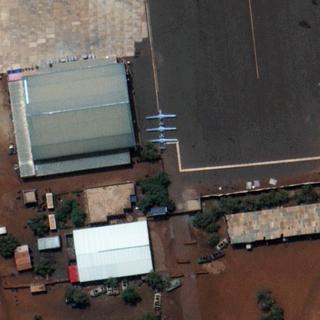


Turkish drones and Russian planes: Aerial warfare comes to West Africa
InvestigationTo track down jihadist fighters or pro-independence rebels, the military juntas in power in Mali, Burkina Faso and Niger have considerably reinforced their air assault resources with the help of their foreign partners in Ankara and Moscow.
It's a base whose existence the Burkinabe authorities have kept secret. And with good reason: it houses almost a dozen drones, one of the most valuable weapons of the junta led by Captain Ibrahim Traoré. Located by Le Monde, which has decided not to reveal its exact location, it is situated on the southern outskirts of Ouagadougou. Built out of sight in 2021, it became fully operational at the end of 2022, following the seizure of power by the strongman nicknamed "IB" by his compatriots.
From the base's runway take off armed drones from Turkish manufacturer Baykar (at least six Bayraktar TB2 and two Bayraktar Akinci, the superior model) and surveillance drones from the country's National Intelligence Agency (ANR). Their mission: to track down and strike the jihadist groups that control large swathes of Burkina Faso's territory. Initiated by former president Roch Marc Christian Kaboré (overthrown by the 2022 putsch), the use of armed drones has been intensified by Captain Traoré.
As in other areas, the young officer in the red beret has followed the example of his Malian elder, General Assimi Goïta. Since his coup d'état in Bamako in August 2020, his junta has made drones one of its preferred vectors for striking at its enemies, be they jihadists or pro-independence fighters. In November 2023, these aircraft played a decisive role in the capture of Kidal from the majority-Tuareg rebels of the Permanent Strategic Framework (CSP), a highly symbolic victory for General Goïta's regime. "Drones offer a major operational gain. They have enabled our army to make a leap. It's even thanks to them that we're still holding out," admitted a Malian officer.
'It feeds propaganda'
Primarily military assets, drones have also become a political tool. They serve the sovereignist rhetoric of the Sahelian juntas and embody the "rising strength" of their armies. It's not uncommon to see images of drone strikes in operation, accompanied by triumphalist commentary, on national television news programs in Mali and Burkina Faso.
"This feeds the authorities' propaganda about our supposed superpower with state-of-the-art weapons. But the reality is quite different. They have no control over the security situation, as demonstrated by the double attack [which killed at least 80 people] in the heart of Bamako on September 17," tackled a Malian opposition figure, speaking on the condition of anonymity. Neighboring Niger, the latest to join the club of Sahelian putschists in July 2023, also makes extensive use of unmanned armed aircraft.
You have 76.73% of this article left to read. The rest is for subscribers only.

